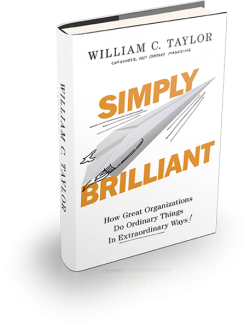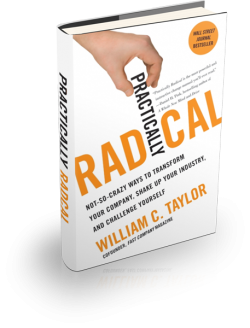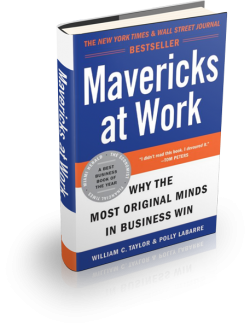I may have a “face for radio” (old joke, I know), but I’ll be on CNN’s “Parker Spitzer” program tonight, 8:00 PM EST, talking about Practically Radical. Some guy named Alec Baldwin will be on too.
Practically Radical–A Busy Day One
Phew! Day One of the launch is drawing to a close, and if tomorrow is anything like today, I may need a vacation by the end of the week!
What a fun (if exhausting) day of reviews, interviews, excerpts, blogs, and tweets. Over on Dan Pink’s blog, I offer three resolutions for how to be “practically radical” in 2011. Meanwhile the folks at Monster.com put together a fun excerpt from the book that captures the new logic of innovation and leadership.
A special thanks to my friends at Fast Company, which not only ran an excerpt from the book but published a really fun interview about why I wrote it and what I want to achieve with it. Finally, Dan Schawbel, over at his Personal Branding blog, put together a really smart interview that was awfully fun to do.
Time for a beer! Lots more to come tomorrow…
A Huge Day Early in the New Year!
Today’s a big day–no, a huge day– for me. At long last, it’s Launch Day for Practically Radical. The countdown is over! Look for all kinds of news and updates over the next few weeks.
Amazingly, and purely coincidentally, it is also the day of my 25th wedding anniversary.
So thanks to all of you for the professional support over the years as I’ve chronicled the ever-changing logic of innovation and leadership. And thanks, Chloe, for putting up with me for the last quarter-century. Some things never change, and I’m glad you’re one of them.
Okay, enough with the sentimentality. I gotta go sell some books!
We’re Havin’ a Party! Join Us on January 5 in NYC
What’s a new book without a book-release party? My friends at TBWA, the amazing marketers behind such iconic brands as Apple, Absolut, Adidas, and Visa, are hosting a “Practically Radical” event in New York City on Wednesday January 5. If you’re going to be in the area, and wish to attend, shoot me an email (williamctaylor@yahoo.com) and I’ll get you the formal invite.
Two weeks ’til launch….
A “Game Plan for Game Changers”
Practically Radical launches three weeks from today, and I’m excited! So excited, in fact, that I have begun to share some of the key ideas in the book. Here’s my new post for HBR, on four simple ideas that constitute a “game plan for game changers.” You can read it here. Enjoy!!!
A “Practically Radical” Review
Every author waits nervously for his or her pre-release review in Publishers Weekly, the bible of booksellers everywhere. Well, the review of Practically Radical is in, and it rocks! PW calls the book “an engaging and briskly written read” with “actionable prescriptions and meaningful examples” that “will captivate and benefit” leaders who want to make change in their organizations.
We’re less than a month away from publication, and this is a nice way to start the ramp-up. Thanks, PW!
Why Nobody Wins Unless Everybody Wins
Recently, I’ve started thinking about something Bruce Springsteen used to say back in the 1980s, because it seems so relevant to what we’re going through as a country, an economy, and as businesses today. During the height of the Born in the USA craze, when Ronald Reagan dominated American politics and Bruce ruled the cultural landscape, he ended his live shows with a simple admonition that was easy to miss amidst the screams of tens of thousands of delirious fans. “Remember,” he’d tell the crowd, “nobody wins unless everybody wins.”
I wish more of us could remember that admonition today. The story of America since the 1980s has been one of huge gains flowing to a tiny segment of the population, with the vast majority barely holding its ground. Through good times and bad, boom and bust, the richest of the rich have been getting richer, while most everyone else has barely gotten by.
What I find so unsettling about the explosion of inequality in the nation is that it flies in the face of everything I’ve learned about what it takes to build a prosperous organization. The most successful companies I’ve gotten to know understand that they create the most value when people at every level share in the value they help to create. That’s why Silicon Valley upstarts are so committed to granting stock options up and down the ranks. It’s also why great old-line companies such as Southwest Airlines, Publix Supermarkets, and W.L. Gore are built around an “ownership culture” that shares the wealth with rank-and-file employees—and shares all kinds of data to help employees run the business.
We know what works inside our best companies—giving as many people as possible a piece of the action, allowing everyone to “share the wealth” they help to create. And yet, as a nation, we have been unable for decades to address the causes and consequences of the “winner-take-all” ethos that is skewing our economy and tearing at our society. That’s the unfinished business of our country—and a pressing challenge for thinkers, innovators, and leaders everywhere.
The Loney Life of the CEO
Like everyone else, I was surprised to read the news this morning that Jeffrey Kindler, the change-minded CEO of Pfizer, Inc. was retiring after less than five years on the job. Who knows all of the factors that contributed to the decision. But what was so striking about the “official story” is that Kindler was so open about the fact that he was so damn tired.
Indeed, reading his quotes, you could feel the fatigue rolling off the page—fatigue that’s got to be familiar to lots of CEOs running companies in lots of different industries.
Here’s my take, for BNET, on the lonely life of the CEO—and how to get killer results without killing yourself in the process. You can find the article here.
Smart Lessons from the Google “Brain Drain”
Everybody seems struck by (and worried about) the flight of talent from Google, either to other (younger) high-profile companies such as Facebook, or to the next generation of venture-funded startups.
I don’t have any specific advice for Google, but concerns about the “brain drain” create an opportunity to offer a bunch of lessons for organizations everywhere about the new battle for talent. Here’s an essay I just did for HBR. I hope it doesn’t drain your brain!


